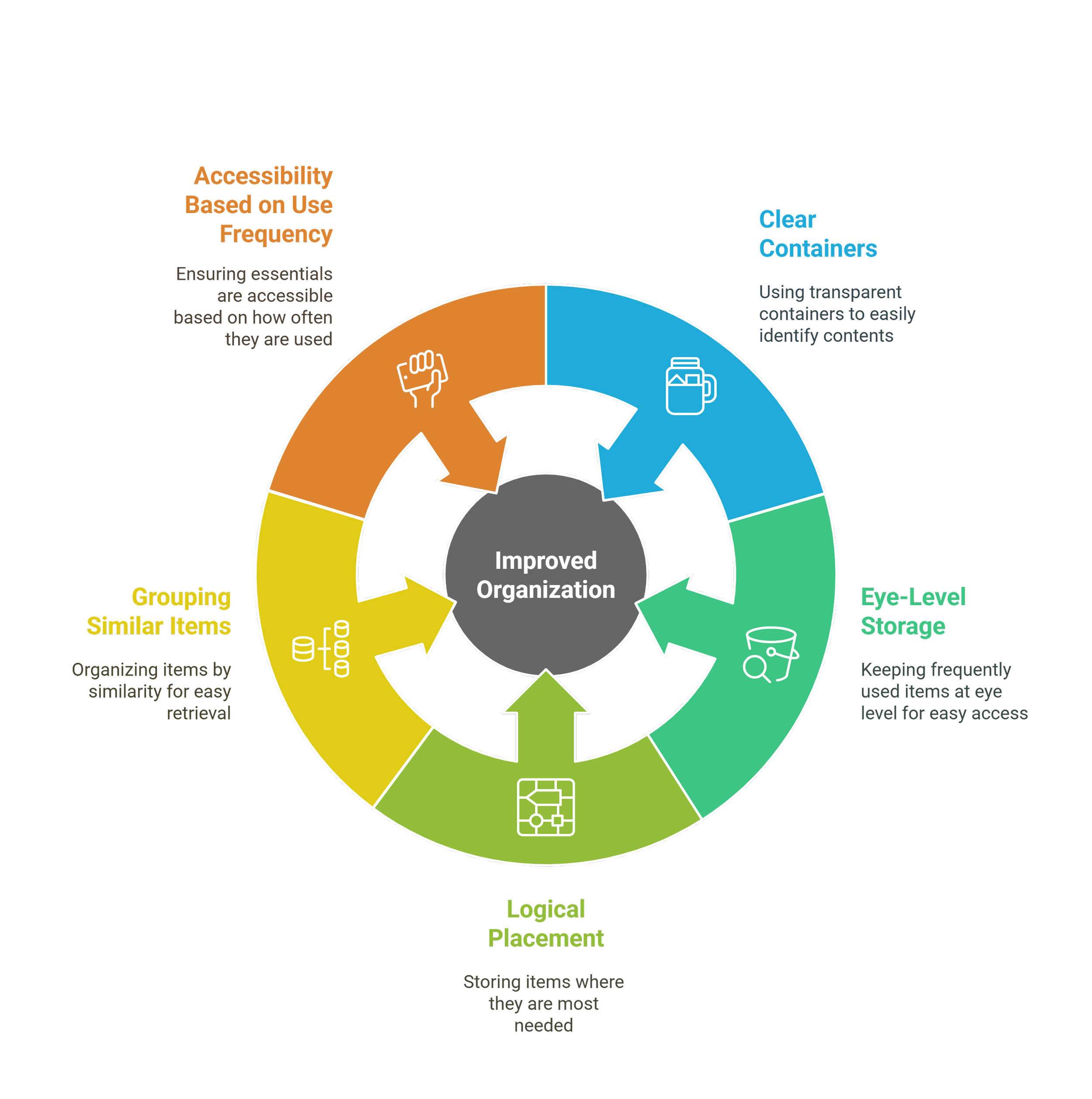Kitchen Chaos to Clarity: A Neurodivergent Guide to Kitchen Organization
A neurodivergent-friendly fridge setup—everything visible, accessible, and easy to maintain.
You know that moment when you open the fridge and find something so old it might qualify for carbon dating? Or when you buy yet another bottle of cumin because the first two are lost in the abyss?
That was my life.
At first, I thought it was just disorganization. But underneath every expired container and duplicate spice purchase was something deeper—evidence of an overwhelmed, burned-out, and barely keeping-up brain.
And here’s what I know now: my way back to stability—both inside and out—started in my kitchen.
The Breaking Point: When My Kitchen Became My Enemy
I was deep in burnout, undiagnosed autistic, and exhausted.
Cooking felt impossible, and eating properly felt like another job. My kitchen was working against me at every turn.
Opening a cabinet felt like setting off an avalanche of Tupperware. Making dinner became an archaeological dig. And the mystery containers in the back of the fridge? They weren’t just a science experiment—I was too drained to even face them.
I didn’t need a Pinterest-perfect kitchen. I needed a system that wouldn’t collapse when I got too busy, overwhelmed, or tired to keep up with it.
But I had no idea where to start.
The Kitchen Whisperer: How Sue Haas Changed Everything
When I found Sue from SORTED DIGS, I didn’t know she started her career as a software developer. I didn’t know about her deep understanding of neurodiversity.
And I definitely didn’t know that my kitchen wasn’t just “messy”—it was a system failure that could be rebuilt in a way that actually worked for my brain.
Sue took one look at my kitchen and said something that changed everything:
“If you can’t see it, it doesn’t exist.”
That was it. That was the moment.
I had spent years trying to force my brain to fit into an organizing system that wasn’t built for me. But what if I could do the opposite? What if I could build a system around how my brain actually works?
The Revolution Begins: Engineering a System That Works
Sue didn’t try to “fix” my habits—she designed a system that embraced them.
Instead of traditional organizing rules, she applied systems thinking, restructuring my kitchen to work for me, not against me.
The Deeper Shift: Cooking as a Stabilizing System
What I didn’t expect was how profoundly this would change my relationship with food.
I realized something unexpected: Cooking and eating properly were not just part of my survival—they were part of my way back to myself.
This wasn’t just about my kitchen. This was about stabilizing my life.
Once my kitchen stopped fighting against me, eating properly became easier. I didn’t default to takeout because I couldn’t face the chaos. Cooking wasn’t another stressor—it was a small act of care that helped regulate my nervous system.
Sue’s system didn’t just make my kitchen more functional. It gave me back the ability to nourish myself.
One Year Later: Imperfect, but Functional
Here’s the truth: it’s not perfect.
Life still happens. Chaos still creeps in. But I have a system now—a way to reset before things spiral.
No more guilt about wasted food.
No more duplicate purchases.
No more overwhelm when cooking.
No more hitting burnout before realizing something needs to change.
Most importantly? My kitchen is no longer a source of stress—it’s a place of calm. Each organized drawer, visible container, and moment of ease in the kitchen prove that small changes can have huge impacts.
Why This Matters for You
If you…
✅ Have ever found something in your fridge that could be classified as a new life form
✅ Buy duplicates because you can’t remember what you already have
✅ Feel overwhelmed at the mere thought of cooking
✅ Need to see things to remember they exist
✅ Are tired of fighting against your brain’s natural patterns
…then Sue’s approach might be exactly what you need.
She doesn’t just organize spaces—she engineers systems that turn potential challenges into strengths.
The Bigger Truth
What I discovered through working with Sue went beyond an organized kitchen. I learned that:
It’s okay to need things to be visible.
Systems should adapt to our brains—not the other way around.
Small changes can have huge impacts on daily life.
The right support can transform overwhelming spaces into peaceful ones.
Ready for Your Own Kitchen Revolution?
Sue Haas is the real deal. You can find her at www.sorteddigs.com
P.S. Not only can I find my spatula now, but I haven’t fearfully opened a mystery container in months. That’s real progress.
About Sue Haas:
Sue Haas began her career as a software developer before shifting her extensive skills toward engineering organizational systems. As a neurodiversity-informed organizer, she combines both expertise and empathy in every project. Her approach isn’t about Pinterest-perfect; it’s about creating functional spaces and systems that support how your brain truly works.


